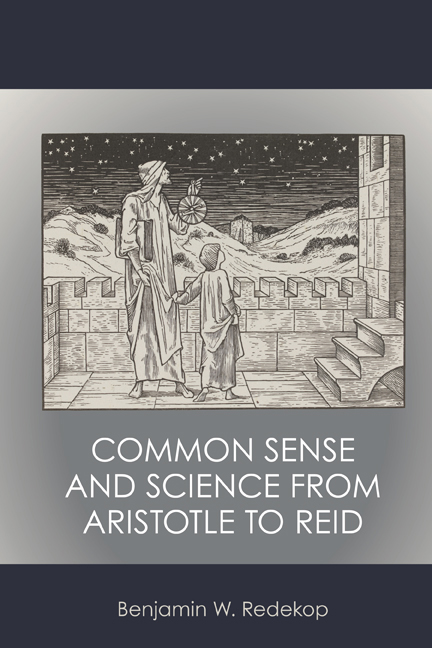Book contents
- Frontmatter
- Contents
- Acknowledgments
- Introduction
- 1 Common Sense and Scientific Thinking before Copernicus
- 2 The Challenge of Modern Science and Philosophy
- 3 Common Notions, Sens Commun: Herbert of Cherbury and Renè Descartes
- 4 Hobbes, Locke, and Innatist Responses to Skepticism and Materialism
- 5 Common Sense in Early Eighteenth-Century Thought
- 6 Common Sense and Moral Sense: Buffier, Hutcheson, and Butler
- 7 Common Sense and the Science of Man in Enlightenment Scotland: Turnbull and Kames
- 8 Common Sense, Science, and the Public Sphere: The Philosophy of Thomas Reid
- Epilogue
- Notes
- Index
3 - Common Notions, Sens Commun: Herbert of Cherbury and Renè Descartes
Published online by Cambridge University Press: 07 November 2020
- Frontmatter
- Contents
- Acknowledgments
- Introduction
- 1 Common Sense and Scientific Thinking before Copernicus
- 2 The Challenge of Modern Science and Philosophy
- 3 Common Notions, Sens Commun: Herbert of Cherbury and Renè Descartes
- 4 Hobbes, Locke, and Innatist Responses to Skepticism and Materialism
- 5 Common Sense in Early Eighteenth-Century Thought
- 6 Common Sense and Moral Sense: Buffier, Hutcheson, and Butler
- 7 Common Sense and the Science of Man in Enlightenment Scotland: Turnbull and Kames
- 8 Common Sense, Science, and the Public Sphere: The Philosophy of Thomas Reid
- Epilogue
- Notes
- Index
Summary
The previous chapter focused on the ways in which early-modern science, and the philosophy that developed in its wake, came into conflict with commonsense experience and understandings. However, it would be a mistake to think that the modern philosophy of common sense was simply a reaction to the New Science; in fact, modern science was both a stimulus and a methodological resource for thinking about “principles” of common sense. And there were other intellectual currents in the early-modern period—including the rise of modern skepticism—that led a variety of thinkers who predated Reid to argue that human beings intuitively perceive certain notions, ideas, truths, or principles that condition our experience and make moral, scientific, and religious knowledge possible. This tradition of thought stretched from Herbert of Cherbury and René Descartes through the Cambridge Platonists and other English innatists to Henry Lee, G. W. Leibniz, the Third Earl of Shaftesbury, Claude Buffier, Frances Hutcheson, Joseph Butler, George Turnbull (Thomas Reid’s teacher), and Henry Home (Lord Kames), Reid’s friend and interlocutor.
While lines of influence between such thinkers are not always evident, and they did not all employ the term “common sense,” they were responding to many of the same currents in modern thought, and in similar ways. Viewed against the background of such thinkers, the thought of Reid and his followers in the late eighteenth and early nineteenth centuries was a continuation and development of an existing, albeit loosely affiliated, tradition of modern thought. Reid was thus mistaken when he wrote in 1764 that the notion of “natural suggestions”— natural principles of mind like causality that are suggested by experience—had “entirely […] escaped the notice of philosophers.” Like most philosophers, Reid was trying to establish himself as someone with something new to say, and he mainly had in mind those post-Lockean philosophers who subscribed to the notion that the main constituents of thought are “ideas” produced by experience and reflection.
- Type
- Chapter
- Information
- Common Sense and Science from Aristotle to Reid , pp. 33 - 46Publisher: Anthem PressPrint publication year: 2020



